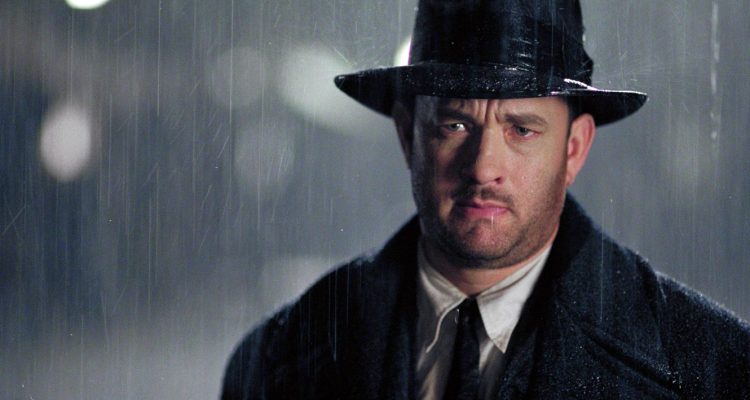 “Cast Away” (2000)
“Cast Away” (2000)
Hate on Tom Hanks and Robert Zemeckis for “Forrest Gump” if you want (we know some of us certainly do), or marvel at the exclusion of Hanks’ portrayal of a retard who meets everyone that matters in the ’50s, ’60s and ’70s while reminiscing over chocolate bon bons in this feature, we’ll still take the duo’s collaboration on “Cast Away” over it any day of the week. While mild dissent in our ranks may exist over Zemeckis’ film and Hanks’ portrayal within, with all due respect: fuck you guys. A one man show that’s all Hanks (it earned him his fifth Best Actor Oscar nom), he carries the hard-to-pull-off film in two excellently bifurcated notes. Initially, Hanks gained weight to portray the paunchy FedEx executive everyman who is stranded on a desert island when his rush delivery airplane crashes over the South Pacific. Production then stopped for an entire year so Hanks could drop almost 60 pounds and grow a woolly beard to play the emaciated man trying to survive on an island with only his volleyball friend Wilson to keep him company. Throughout, Hanks’ various stages of despair, loneliness, resolve and surrender are acutely real and poignant, filling in the contours of a $85 million picture that is essentially a man talking to himself on an island. But in fact, the middle act of the film is almost silent: no dialogue, voice-over or score. It is simply Tom Hanks and the grimaced emotions on his face. Perhaps just as moving is the film’s sentimental, but still affecting conclusion. Hanks returns to civilization years later, his fiancée having moved on with a new husband and children. His quiet resignation is devastating but ultimately, his where-will-life-take-us-now acceptance and curiosity is a hopeful and life-affirming reminder that, as cliche as it sounds, tomorrow the sun will still rise.
 “Road to Perdition” (2002)
“Road to Perdition” (2002)
With the film now almost a decade old, it’s easy to forget how much of a game changer the role of Michael Sullivan was for Tom Hanks. While he had already been making turns in dramas — as the valiant astronaut in “Apollo 13,” as the gallant AIDS victim in “Philadelphia,” as the stoic WWII Captain in “Saving Private Ryan,” as the shipwrecked man in “Cast Away” and as the simpleton storyteller of history in “Forrest Gump” — this was the first (and still only) time where the actor took on a deeply, morally conflicted character whose sympathy is hard earned. Based on a graphic novel and exquisitely directed by Sam Mendes, the film finds Hanks playing an enforcer on the run from the very crime family he works for with his young son in tow. As they spend six weeks on the lam in the Midwest, Hanks becomes more closely connected with his progeny than he ever had before and together they form a unique, though undeniably loving, bond. Hanks has to navigate a whirl of emotions here that are all contained in the poker face facade he needs to keep up in order for the both of them to survive. It’s one of Hanks’ best performances because much of what is transmitted between father and son are some tiny gestures, subtle changes in facial expressions and sudden acts of warmth. The role finds the actor challenging himself with a part that is all small moments, with no grand gestures or important speeches to fall back on and Hanks performs wonderfully in a minor key. It’s a cold, harsh world Michael Sullivan lives in, but in that strange, heightened, surreal time with his son, it might be the best time of his life.
 Alternates: “Splash” was the movie that really made Hanks an A-lister, and it’s an accomplished comic turn to be sure, although he has given better performances since. From the everyman department, “Sleepless In Seattle,” “Apollo 13” and “The Green Mile” are all solid versions of what he’s done better elsewhere, and while he’s also strong in “Catch Me If You Can,” it’s not his most colorful performance. He’s clearly having enormous fun in “Charlie Wilson’s War,” although the film isn’t what you’d hope for from a collaboration between Mike Nichols and Aaron Sorkin.
Alternates: “Splash” was the movie that really made Hanks an A-lister, and it’s an accomplished comic turn to be sure, although he has given better performances since. From the everyman department, “Sleepless In Seattle,” “Apollo 13” and “The Green Mile” are all solid versions of what he’s done better elsewhere, and while he’s also strong in “Catch Me If You Can,” it’s not his most colorful performance. He’s clearly having enormous fun in “Charlie Wilson’s War,” although the film isn’t what you’d hope for from a collaboration between Mike Nichols and Aaron Sorkin.
Finally, we’d be remiss without mentioning two of the very best Hanks performances, which just missed out on the list. It might only be a vocal turn, but Hanks is key to the success of the “Toy Story” films: just try to imagine the jealous but caring Woody with anyone else in the role. And, while the film is easily one of the Coen Brothers’ least successful creatively, Hanks is tremendous in “The Ladykillers,” a performance quite unlike any other he’s given in his career, so good that he almost drags the film up with him. Hanks has long been a favorite on “Saturday Night Live,” one of the most frequent hosts in the show’s history, but he’s rarely given the chance to stretch his comic chops in a similar way, bar “The Ladykillers”: maybe it’s time for him to seek out, say, Adam McKay, for the full-on comedy he’s always been destined to do. — Kimber Myers, Oliver Lyttelton, Matthew Newlin, Rodrigo Perez, Kevin Jagernauth

